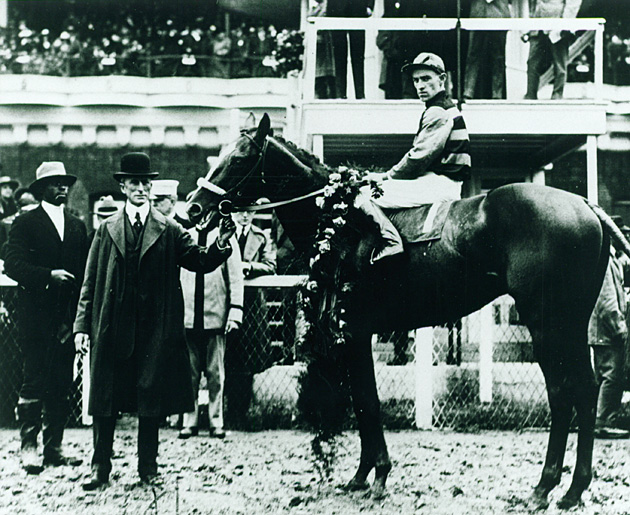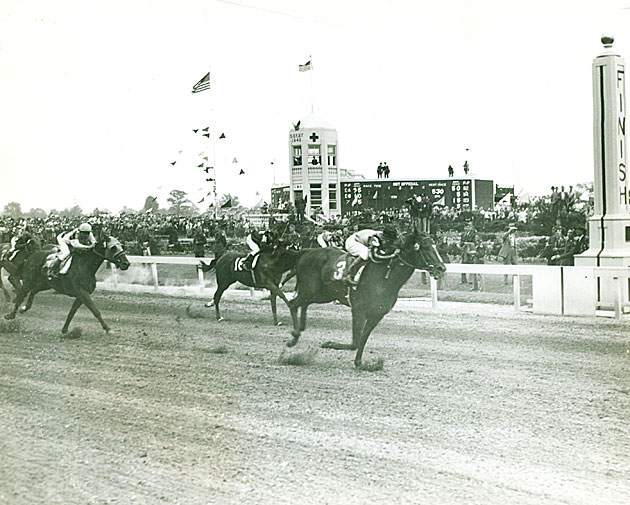Derby History: When the 'Wrong' Entrymate Won

If all goes according to plan, Ahmed Zayat's Zayat Stables will have three entries in the 2015 Kentucky Derby Presented by Yum! Brands (gr. I). The star of "Z show" will be the regally handsome, talented American Pharoah. A homebred—which makes him even more the apple of Zayat's eye—by Pioneerof the Nile, a Zayat homebred who finished second in the 2009 Derby.
ANGST: American Pharoah Forges Way to Zayat's Heart
Sporting the Zayat colors along with American Pharoah will be two yearling purchases: El Kabeir, a gray son of Scat Daddy who has won the Jerome and the Gotham stakes (both gr. III) already this year, and Mr. Z, who has patiently knocked at the black-type door seven times in his two-year career without so much as a "welcome" to the winner's circle.
While American Pharoah will most likely enter the gates as the favorite, not only of the Derby crowd but also of Team Zayat, Derby history shows that on occasion there have been a few "oops" moments when the horse that won wore the right colors but upstaged a more popular stablemate.
One doesn't have to look far into Derby history for the first instance. The 1875 inaugural running set the precedent. Noted Kentucky breeder Hal Price McGrath had a pair of 3-year-old homebreds in his stable. A son of leading sire Lexington, Chesapeake had been the better 2-year-old, having won the August Stakes and the Kentucky Stakes while the small red-headed stepchild—so to speak—Aristides, a son of Leamington, had won three of nine races but none of note.
Coming into the Derby, Aristides' jockey, Oliver Lewis was instructed by McGrath and trainer Ansel Williamson to ensure a torrid pace so the bigger, more powerful, late-running Chesapeake, ridden by William Henry, could swallow up the field and take the prize. (Note that the Derby distance at the time was 1 1/2 miles).
As it sometimes happens, however, the best-laid plans of mice and McGraths go oft awry. Chart notes for that race in the Kentucky Derby Media Guide describe the event this way:
Aristides broke in front but McCreery took lead briefly near end of first quarter. Aristides quickly moved back in front with McCreery, Ten Broeck, Volcano, and Verdigris his nearest rivals...The field continued in that order with Aristides gradually increasing his lead. Owner McGrath, standing near the head of the stretch, waved to jockey Lewis on the little red horse to go on because Chesapeake supposedly the better of the McGrath horses was far back and had no chance.
So as Lewis on the lead held his horse for the anticipated onslaught by Chesapeake, McGrath, realizing his pride and joy had no chance, shouted and waved "go on." Lewis responding by loosening the reins and he and Aristides galloped into Derby history while Chesapeake faded into the also rans of Derby lore.
The 1919 Kentucky Derby also takes its place in Derby history as an "oops" moment, but only to a degree. The Derby was also a moment "the light bulb went on" for one of racing's significant horses.
Had championships been official in 1918, undoubtedly the mantle would have fallen on J.K.L. Ross' Billy Kelly. The gelded bay son of Dick Welles had won 14 of his 17 starts that year including some historic stakes at Saratoga. He was a very good racehorse. Small and angular and altogether homely, he had been blessed, however, with a most agreeable disposition.
In 1918 Ross had also purchased the handsome chestnut colt Sir Barton from his breeder/owner John Madden. A son of Star Shoot, Sir Barton had the looks and the breeding of a stable star and the attitude of being born with a silver bit in his mouth. In his first start for Ross, he repaid his new owner's $10,000 investment by finishing 16th of 20 in the Hopeful Stakes at Saratoga. Even though he never won a race at 2, he finished second in the rich Futurity at Belmont He made no impression whatsoever on the public, and the expensive maiden was at one point 100-1 in the Winter Book for the 1919 Kentucky Derby.
As the 1919 Derby came into focus, Billy Kelly had won two races and came to Kentucky as a leading contender in the minds of Ross and trainer Guy Bedwell. Sir Barton had yet to start his sophomore campaign, but Bedwell still liked the handsome devil and brought him to Kentucky as a workmate and a rabbit for the better-loved Billy Kelly in the Derby.
The Ross entry was a study in contrasts: the experienced winner vs. the maiden, the sweet vs. the sour, the plain vs. the handsome, the star vs. the understudy, the sound vs. the tender-footed. And then the rains came.
Overnight rains had turned the Churchill Downs track into a bog and by race time the track had dried out enough to be officially " heavy." The off track was a blessing for Sir Barton, who was plagued with sore feet, so sore that he often wore piano felt between his shoes and hoofs to cushion the pounding.
Ross' contract jockey Earl Sande was to ride Billy Kelly and Johnny Loftus had taken the assignment on Sir Barton. The strategy was the familiar role of the rabbit: set a fast pace so that the possible threats of Eternal and Uncle Fire—the only perceived competition—would be compromised. While the stable choice was Billy Kelly, Loftus had been instructed to win if he could. And win he did.
The swift pace cut out by Sir Barton coupled with the less-than-firm going worked to the advantage of the rabbit and Loftus. Taking the lead from the start, the pair never looked back and widened the lead throughout the 10 furlongs to win by five lengths over Billy Kelly. A maiden no more, the golden boy transformed from goat to glory. Sir Barton added victories in the Preakness Stakes and Belmont Stakes to become the first Triple Crown winner in the U.S.

Two years later another highly regarded owner/breeder, E.R. Bradley and his Idle Hour Farm, came to the Derby with a pair of homebreds: Black Servant and Behave Yourself. These two were also a study in contrasts. On the one hand was the well-bred Black Servant, a son of Bradley's house stallion Black Toney out of one of Idle Hour's foundation families, the imported Padua family. On the other hand was Behave Yourself, who in the pedigree annals was considered not fashionably bred. Any pedigree pundit would have had to search long and hard to find any notable names in his ancestry.
Conformation and good looks too belonged to Black Servant as Behave Yourself was crooked-legged and gangly.
As 2-year-olds, Behave Yourself was held in much less esteem than his compatriot Black Servant. In prepping for the Kentucky Derby, Black Servant had validated this opinion by winning his first two races at 3 and defeating Behave Yourself in the Blue Grass Stakes.
Bradley and his trainer H.J. Thompson, of course, wanted to win the Derby with the Bradley-connected Black Servant. Idle Hour's contract jockey Lawrence Lyke was given his choice, and he readily picked Black Servant. By default, Charlie Thompson, had the mount on Behave Yourself.
This time there was no "win if you can" instruction. Bradley wanted the winner to be Black Servant. Before the race Bradley had promised $5,000 to the jockey if his horse won and $1,000 if the horse finished in the top three. Whether this had anything to do with the events that transpired can only be speculation, but after the race the jockeys agreed to split the windfall money evenly.
In many ways Lyke sealed his and Black Servant's fate from the outset. He sent Black Servant to the lead and was as profligate with his mount's speed as a sailor on shore leave is with his money. Behave Yourself locked horns with Black Servant and took a half-length lead in the stretch. Dueling through the final yards, Behave Yourself and Thompson gave no quarter to the chosen one, winning by a head.
Bradley was publicly thrilled to have won his first Kentucky Derby (he would add three more) but privately displeased that Thompson had not let Black Servant win.
Pedigree and conformation dictated their later fates. Black Servant went to stud at Idle Hour where he sired Blue Larkspur, a champion racehorse and leading sire and broodmare sire. Behave Yourself was relegated to the Army Remount Service.
If the amount of buzz around a horse could put the Derby trophy on the winning owner's mantel, then Greentree Stable's Devil Diver would have won the 1942. In his prep for the Derby, Mrs. Payne Whitney's bay son of Greentree stallion St. Germans, had upset Calumet Farm's 1941 Triple Crown winner and Horse of the Year Whirlaway in the Phoenix Stakes at Keeneland, giving the 3-year-old instant fame. Plus, Devil Diver had been a very good juvenile, having won the Hopeful Stakes and Breeders' Futurity.
Shut Out, the other half of the Greentree entry, had won the Blue Grass Stakes at Keeneland and finished behind Devil Diver in the Hopeful Stakes at 2, but the homebred chestnut son of Equipoise was not thought of in the same vein as Devil Diver.
Coming into Louisville, Devil Diver had the better record. He had won four of his 12 starts and had never been unplaced. Oddly enough though, prior to the Hopeful, Shut Out had been the more highly regarded Greentree juvenile.
Eddie Arcaro, the contract jockey for Greentree and trainer John Gaver, was given his choice of mounts for the Derby. Arcaro, who had already won Derbys aboard Lawrin and Whirlaway, elected to ride the medium-sized, powerfully built Devil Diver. "I wouldn't trade my chances on Devil Diver with those of any other rider," he stated.&
For Arcaro the choice over Shut Out was not something in question as the jockey added, "If I were not riding Devil Diver, I'd like the mount on Requested." Requested had some pretty good credentials on his own, having won the Flamingo Stakes and the Wood Memorial Stakes in his preparation for Louisville.
On May 2, 1942, 73 years to the day of this year's running, 15 3-year-olds contested the 68th running of the Kentucky Derby. Despite the presence of juvenile champion Alsab in the race as well as Requested, the Greentree entry, largely on the strength of Devil Diver's defeat of Whirlaway, was favored.
Wayne Wright, the jockey who inherited the ride on Shut Out, kept the lesser light just ahead of Arcaro and Devil Diver until the stretch when each asked for more from his mount. Shut Out responded in the affirmative while Devil Diver had no answer. Shut Out took the prize over Alsab. Devil Diver, with a one-paced effort finished sixth. Requested, Arcaro's other choice beat only Boot and Spur.
Shut Out was not just a one-hit wonder, however. He won the Belmont Stakes and the Travers Stakes later in the year. Even with his two classic victories, he did not earn year-end honors. The champion 3-year-old title fell to Alsab.
Devil Diver's star might have lost a bit of luster in his sophomore season, but as an older horse he shone again, winning championship titles in both 1943 and 1944.
If any of the Zayat horses wins this year's Derby, which one will it be? While all the handicapping tools point to American Pharoah, history just might have other plans.
